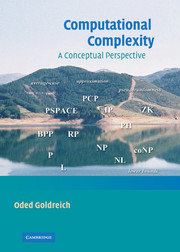Book contents
- Frontmatter
- Contents
- List of Figures
- Preface
- Organization and Chapter Summaries
- Acknowledgments
- 1 Introduction and Preliminaries
- 2 P, NP, and NP-Completeness
- 3 Variations on P and NP
- 4 More Resources, More Power?
- 5 Space Complexity
- 6 Randomness and Counting
- 7 The Bright Side of Hardness
- 8 Pseudorandom Generators
- 9 Probabilistic Proof Systems
- 10 Relaxing the Requirements
- Epilogue
- Appendix A Glossary of Complexity Classes
- Appendix B On the Quest for Lower Bounds
- Appendix C On the Foundations of Modern Cryptography
- Appendix D Probabilistic Preliminaries and Advanced Topics in Randomization
- Appendix E Explicit Constructions
- Appendix F Some Omitted Proofs
- Appendix G Some Computational Problems
- Bibliography
- Index
2 - P, NP, and NP-Completeness
Published online by Cambridge University Press: 05 June 2012
- Frontmatter
- Contents
- List of Figures
- Preface
- Organization and Chapter Summaries
- Acknowledgments
- 1 Introduction and Preliminaries
- 2 P, NP, and NP-Completeness
- 3 Variations on P and NP
- 4 More Resources, More Power?
- 5 Space Complexity
- 6 Randomness and Counting
- 7 The Bright Side of Hardness
- 8 Pseudorandom Generators
- 9 Probabilistic Proof Systems
- 10 Relaxing the Requirements
- Epilogue
- Appendix A Glossary of Complexity Classes
- Appendix B On the Quest for Lower Bounds
- Appendix C On the Foundations of Modern Cryptography
- Appendix D Probabilistic Preliminaries and Advanced Topics in Randomization
- Appendix E Explicit Constructions
- Appendix F Some Omitted Proofs
- Appendix G Some Computational Problems
- Bibliography
- Index
Summary
For as much as many have taken in hand to set forth in order a declaration of those things which are most surely believed among us; Even as they delivered them unto us, who from the beginning were eyewitnesses, and ministers of the word; It seems good to me also, having had perfect understanding of all things from the very first, to write unto thee in order, most excellent Theophilus; That thou mightest know the certainty of those things, wherein thou hast been instructed.
Luke, 1:1–4The main focus of this chapter is the P-vs-NP Question and the theory of NP-completeness. Additional topics covered in this chapter include the general notion of a polynomial-time reduction (with a special emphasis on self-reducibility), the existence of problems in NP that are neither NP-complete nor in P, the class coNP, optimal search algorithms, and promise problems.
Summary: Loosely speaking, the P-vs-NP Question refers to search problems for which the correctness of solutions can be efficiently checked (i.e., if there is an efficient algorithm that given a solution to a given instance determines whether or not the solution is correct). Such search problems correspond to the class NP, and the question is whether or not all these search problems can be solved efficiently (i.e., if there is an efficient algorithm that given an instance finds a correct solution).
Thus, the P-vs-NP Question can be phrased as asking whether or not finding solutions is harder than checking the correctness of solutions. […]
Information
- Type
- Chapter
- Information
- Computational ComplexityA Conceptual Perspective, pp. 44 - 107Publisher: Cambridge University PressPrint publication year: 2008
